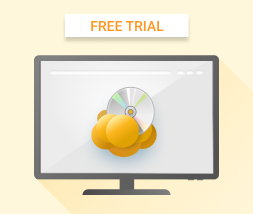Should you back up data to the cloud? The answer will depend on a variety of factors specific to your situation, of course. This article explains cloud storage benefits, risks and cost considerations, and why cloud backups can, in many cases, be more cost-effective, provide faster data restoration, and deliver higher rates of availability than on-premise backups.
Advantages of Cloud Backup
There are several major benefits of cloud storage that can make the cloud an ideal data backup location.
Cloud Backup Costs
First, cloud backups can be less expensive overall, especially if you take advantage of "cool" and "cold" cloud storage pricing.
To illustrate cloud backup cost savings, consider the following simple scenario: Imagine that you have 1000 gigabytes' worth of data to back up. Using AWS's Glacier storage, whose pricing starts at $0.004 per gigabyte per month, you'd pay $4 per month for storage.
If you chose instead to back the data up to an on-premise location, you could expect to pay about $50 to purchase a single hard disk to store 1000 gigabytes of data. Of course, to achieve robust storage you'd want to purchase multiple disks in order to set up a RAID array or another type of redundant storage scenario, so your hard disk acquisition costs would probably end up being more like $150. At that rate, you'd have to use the disk array for about 37 months before your storage costs would become lower than those of AWS Glacier storage at $4 per month. Given that a commodity hard disk's lifespan might be only three years, you might have to replace the disks before you reach 37 months.
Note, too, that this math doesn't factor in additional costs associated with on-premise storage, such as the expense of purchasing servers to host your hard disks, the software you might require to set up an operating system and a storage array and electricity costs -- which can cost many hundreds of dollars per year for a single server.
This is just a simplistic scenario, of course. It doesn't take into account the complete costs of cold data storage, such as data retrieval fees. It does, however, highlight how cloud-based data backup can be more cost-effective overall in many scenarios.
Overall, however, cloud backup costs are likely to be much lower than backing up to on-premise hardware that you buy and maintain yourself.
Further reading Guide to Becoming a Cloud-First MSP
Data Availability
Another one of the advantages of cloud backup is that when your data exists in the cloud, it is available anywhere with an Internet connection.
You could possibly configure on-premise backups to be available from anywhere, too. However, doing so securely will require a data migration project plan, including a complex firewall configuration, and probably a VPN. Even with those solutions in place, your on-premise backup data may still not always be accessible. Unless you are really, really good at network administration, the network that links your on-premise data to the Internet is probably going to experience more downtime than the network managed by a major cloud provider. For example, AWS promises “11 9s” of availability for S3 storage; that’s a figure that is very hard to beat on self-managed infrastructure. Network downtime means your data will cease to be available to you from anywhere.
Further reading Cloud Backup for Small Business
Easy Data Restoration
Another benefit among the advantages of cloud backup is that, if you host your production workloads in the cloud, cloud backup data can easily be copied back into production in the event that your production application environment crashes or needs to be rebuilt. (For examples of the various methods by which cloud data can be backed up within the cloud, see this article on AWS EC2 backups.)
With on-premise backups, this may not be the case. Depending on bandwidth, it will likely take much longer to upload large amounts of backup data from an on-premise datacenter to the cloud than it would move data within the cloud. This is true even if your cloud backups are based on cold storage and require some time to retrieve data.
Tips for Cost-Effective Cloud Storage and Backup
In order to achieve a proper balance between cloud storage benefits, risks and cost considerations, you should devise a cloud backup strategy that allows you to take advantage of the most cost-effective cloud storage that meets your needs. The following practices can help you to do this:
- Use cool or cold storage. These storage tiers offer lower cloud backup costs. The trade-off is that there may be some delay in the time it takes to retrieve data. But for backups, this is usually not a problem because the delays are not long enough to cause a significant increase in the amount of time required to restore data from backups.
- Store data in the cloud you already use. As noted above, it will usually be fastest to restore data from a cloud backup location to a production environment within the same cloud. Therefore, if you want to achieve the best balance between cloud backup costs and performance, consider using the same cloud for hosting both your backups and your production applications.
- Choose your cloud region carefully. Cloud storage costs can vary depending on which region you use. On AWS, for example, the U.S.-East region offers the lowest rates for Glacier storage. While for production environments it may be important to host data in regions that are closest to where it needs to be served, this is a less important consideration for backups. You can, therefore, achieve more cost-effective cloud storage by choosing a less expensive region. Of course, bear in mind that compliance requirements and data sovereignty issues may affect which regions you can choose.
- Think about data availability. Cloud-based data is likelier to be more highly available than on-premise data because your local data center or network will probably crash more often than a professionally managed cloud. However, remember that even major public clouds sometimes fail. If you have mission-critical backup data that is absolutely essential for business continuity, you might want to back it up to multiple locations.
Conclusion
The benefits of cloud storage are numerous. Generally speaking, cloud backup costs are lower than those of on-premise backup infrastructure. Cloud data will also generally offer higher levels of availability and easier access than on-premise data.
Your mileage may vary, of course, but if you are currently backing up on-premise, there's a good chance that you could try the advantages of cloud backup, and achieve cost savings and higher availability.





